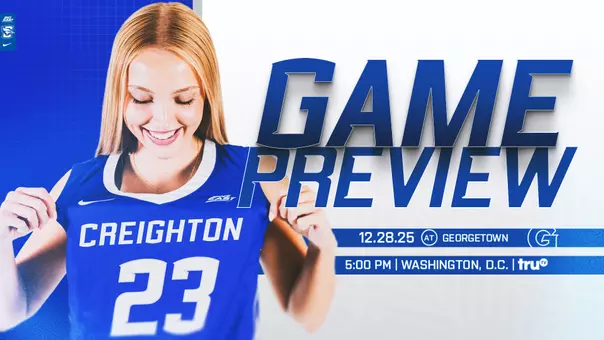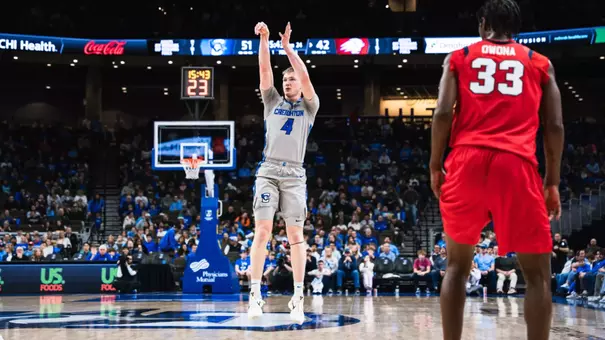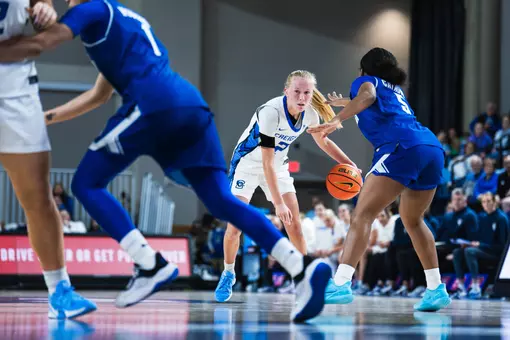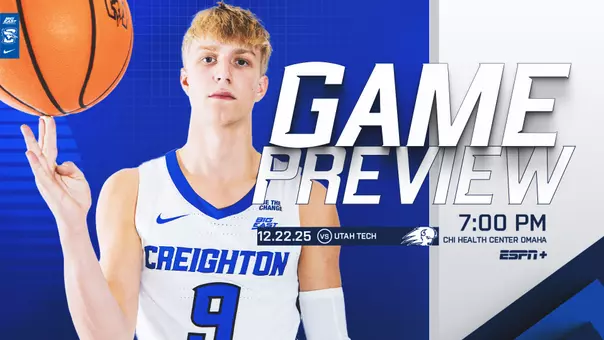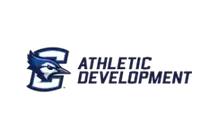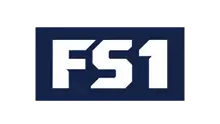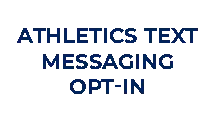Josh Dotzler, Anthony Tolliver, Mykel Parham
Photo by: Joey Gardner
Tolliver Returns to Creighton To Lead Timely Discussion on Racial Equality
11/1/2020 9:25:00 PM | Men's Basketball, Women's Basketball
Anthony Tolliver, Mykel Parham and Josh Dotzler discussed Black Lives Matter, group economics, athlete platforms, voting and more
OMAHA, Neb. -- Memphis Grizzlies forward Anthony Tolliver returned to his alma mater on Sunday night to participate in a discussion on Black Lives Matter, group economics, athlete platforms, The Grey Challenge, voting and more.
The 2007 Creighton graduate and 2019 Creighton Athletics Hall of Fame inductee was joined by 2009 Creighton alum Josh Dotzler and current women's basketball sophomore forward Mykel Parham before an audience that included current Bluejay student-athletes and staff in addition to many more on the school's YouTube channel.
The hour-long town hall meeting on racial equality was hosted inside D.J. Sokol Arena on the Creighton campus.
Tolliver opened the night relaying the impact his family has had on him, and how his mother's death in 2008 when he was just 23 changed his life. "From that day on, my whole goal and mission was to have an impact on people's lives in the same way that my mother did. That's literally what I think about regularly. Just treating people right and trying to impact people positively on a daily basis."
Parham then asked Tolliver about his decision to wear "Group Economics" on the back of his jersey in the NBA Bubble. "This is something that I'm really, really passionate about," said Tolliver, who then joked that he might need a full hour on the topic. "Group economics, in a nutshell, is people coming together and using their resources, whether it be money, human capital or expertise. Coming together and building or doing something that they can't necessarily do themselves. Many other cultures have done this for a long time...but I chose that because in the African American community that isn't used enough. I look at this as something that everybody can use. Understand that you as an individual, you can do certain things and the impact you can make. But when you get in group of like-minded people, possibilities become pretty endless."
Tolliver also had strong opinions about the Black Lives Matter movement and explained how it's different than the organization of the same name. "Everyone who says it, and everyone who represents it, as far as the statement 'Black Lives Matter', does not belong to or have an association with, the organization. I have never donated a penny to the organization. I don't have any allegiance to the organization. I just believe that Black lives matter. And I believe they should matter more than they do in a lot of different cases. And I think that is the sentiment probably for 90% of the people who say it. Just having to explain it over and over and over...there's a difference between the two."
Parham, a Minneapolis-area native, shared her own experiences from earlier this summer watching the video of George Floyd's death. "The videos are always very tough to watch. They always bring tears to my eyes thinking about the first time I saw the video of George Floyd, and sitting in kitchen with my mom and over-analyzing it and seeing every single part…you overthink everything. All of the sudden it's starting to seem like there's an abundance of these instances when in reality this has been happening for hundreds of years and we are only now knowing about it now because we have video."
Dotzler, a 2007 Creighton grad who now heads up ABIDE in Omaha, added his perspective.on change. "When something happens, you can either get bitter or you can get better. That's just the reality of life but you can use challenges for good or they can push us in the other direction. When you grow up as a minority, I almost had no choice with a white dad and a black mom. I lived in two worlds all the time. I feel like my experiences have positioned me to be able to see perspectives on both sides and to really try to be a bridge. Part of my calling in life is to try to be a bridge to help both sides see the perspective that the other side is trying to communicate."
The night ended with talk of Tuesday's upcoming election.
"With an election in two days, I think it's important for everyone to realize that we are electing people that are going to make those decisions," noted Parham. "That's where you have to remember your impact. You have to remember that who you are voting for will be affecting those kinds of people and those kinds of neighborhoods. Voting will not solve all our problems right now, but it is a step in the right direction."
Tolliver agreed. "You being a Democrat or a Republican, I could care less. I don't have an allegiance to either. I just want to understand the people who are running for these offices. If I feel like you are going to help people, that's what I care about. How are you going to help people? If you are going to do the best job helping the people in this particular community, then I'm going to vote for you. It's not the end all, be all. It's just one piece of the puzzle. It's a big reason why I feel like education and understanding these issues is really important. It's because there's so many issues. What you can do is educate yourself on these different issues. There's going to be something that catches your eye and captures your imagination more than anything else. And to me, that's what you need to dig deeper in, learn more about and understand better. I definitely encourage everybody in here to do that. To take time, to really understand what you feel like you're being called to impact. Go learn about it, and then go impact it in whatever way you can."
You can watch the full video below:
.
As a student-athlete at Creighton, Tolliver was a three-year starter who scored 1,004 points and grabbed 603 rebounds as a Bluejay center from 2003-07. He still ranks sixth in program history in blocked shots (136) and 42nd in points (1,004). He was named a Senior CLASS Award All-American, the NACDA I-AAA Scholar-Athlete of the Year and a Second Team CoSIDA Academic All-American in 2006-07. He graduated in May of 2007 as a Finance major with a league-record 10 Missouri Valley Conference Scholar-Athlete of the Week Awards, and was also the recipient of the Carl M. Reinert, S.J., Award as Creighton's top male student-athlete.
Tolliver has played in the NBA the past 12 years with 10 different franchises, wrapping up the 2019-20 season in the NBA Bubble with the Memphis Grizzlies. After making just 21 three-pointers with the Bluejays in college, Tolliver's 861 career three-pointers are more than Hall of Famers John Stockton, Chris Mullin, Clyde Drexler and Larry Bird. He remains a well-respective leader within the NBA Players Association, for which he works alongside Chris Paul and Andre Iguodala as the secretary and treasurer.
Tolliver's appearance marked the second straight week that a current NBA player returned to the Creighton campus, as 2003 graduate Kyle Korver also spoke inside D.J. Sokol Arena one week earlier about white privilege, among many other topics.
The 2007 Creighton graduate and 2019 Creighton Athletics Hall of Fame inductee was joined by 2009 Creighton alum Josh Dotzler and current women's basketball sophomore forward Mykel Parham before an audience that included current Bluejay student-athletes and staff in addition to many more on the school's YouTube channel.
The hour-long town hall meeting on racial equality was hosted inside D.J. Sokol Arena on the Creighton campus.
Tolliver opened the night relaying the impact his family has had on him, and how his mother's death in 2008 when he was just 23 changed his life. "From that day on, my whole goal and mission was to have an impact on people's lives in the same way that my mother did. That's literally what I think about regularly. Just treating people right and trying to impact people positively on a daily basis."
Parham then asked Tolliver about his decision to wear "Group Economics" on the back of his jersey in the NBA Bubble. "This is something that I'm really, really passionate about," said Tolliver, who then joked that he might need a full hour on the topic. "Group economics, in a nutshell, is people coming together and using their resources, whether it be money, human capital or expertise. Coming together and building or doing something that they can't necessarily do themselves. Many other cultures have done this for a long time...but I chose that because in the African American community that isn't used enough. I look at this as something that everybody can use. Understand that you as an individual, you can do certain things and the impact you can make. But when you get in group of like-minded people, possibilities become pretty endless."
Tolliver also had strong opinions about the Black Lives Matter movement and explained how it's different than the organization of the same name. "Everyone who says it, and everyone who represents it, as far as the statement 'Black Lives Matter', does not belong to or have an association with, the organization. I have never donated a penny to the organization. I don't have any allegiance to the organization. I just believe that Black lives matter. And I believe they should matter more than they do in a lot of different cases. And I think that is the sentiment probably for 90% of the people who say it. Just having to explain it over and over and over...there's a difference between the two."
Parham, a Minneapolis-area native, shared her own experiences from earlier this summer watching the video of George Floyd's death. "The videos are always very tough to watch. They always bring tears to my eyes thinking about the first time I saw the video of George Floyd, and sitting in kitchen with my mom and over-analyzing it and seeing every single part…you overthink everything. All of the sudden it's starting to seem like there's an abundance of these instances when in reality this has been happening for hundreds of years and we are only now knowing about it now because we have video."
Dotzler, a 2007 Creighton grad who now heads up ABIDE in Omaha, added his perspective.on change. "When something happens, you can either get bitter or you can get better. That's just the reality of life but you can use challenges for good or they can push us in the other direction. When you grow up as a minority, I almost had no choice with a white dad and a black mom. I lived in two worlds all the time. I feel like my experiences have positioned me to be able to see perspectives on both sides and to really try to be a bridge. Part of my calling in life is to try to be a bridge to help both sides see the perspective that the other side is trying to communicate."
The night ended with talk of Tuesday's upcoming election.
"With an election in two days, I think it's important for everyone to realize that we are electing people that are going to make those decisions," noted Parham. "That's where you have to remember your impact. You have to remember that who you are voting for will be affecting those kinds of people and those kinds of neighborhoods. Voting will not solve all our problems right now, but it is a step in the right direction."
Tolliver agreed. "You being a Democrat or a Republican, I could care less. I don't have an allegiance to either. I just want to understand the people who are running for these offices. If I feel like you are going to help people, that's what I care about. How are you going to help people? If you are going to do the best job helping the people in this particular community, then I'm going to vote for you. It's not the end all, be all. It's just one piece of the puzzle. It's a big reason why I feel like education and understanding these issues is really important. It's because there's so many issues. What you can do is educate yourself on these different issues. There's going to be something that catches your eye and captures your imagination more than anything else. And to me, that's what you need to dig deeper in, learn more about and understand better. I definitely encourage everybody in here to do that. To take time, to really understand what you feel like you're being called to impact. Go learn about it, and then go impact it in whatever way you can."
You can watch the full video below:
.
As a student-athlete at Creighton, Tolliver was a three-year starter who scored 1,004 points and grabbed 603 rebounds as a Bluejay center from 2003-07. He still ranks sixth in program history in blocked shots (136) and 42nd in points (1,004). He was named a Senior CLASS Award All-American, the NACDA I-AAA Scholar-Athlete of the Year and a Second Team CoSIDA Academic All-American in 2006-07. He graduated in May of 2007 as a Finance major with a league-record 10 Missouri Valley Conference Scholar-Athlete of the Week Awards, and was also the recipient of the Carl M. Reinert, S.J., Award as Creighton's top male student-athlete.
Tolliver has played in the NBA the past 12 years with 10 different franchises, wrapping up the 2019-20 season in the NBA Bubble with the Memphis Grizzlies. After making just 21 three-pointers with the Bluejays in college, Tolliver's 861 career three-pointers are more than Hall of Famers John Stockton, Chris Mullin, Clyde Drexler and Larry Bird. He remains a well-respective leader within the NBA Players Association, for which he works alongside Chris Paul and Andre Iguodala as the secretary and treasurer.
Tolliver's appearance marked the second straight week that a current NBA player returned to the Creighton campus, as 2003 graduate Kyle Korver also spoke inside D.J. Sokol Arena one week earlier about white privilege, among many other topics.
Creighton Men's Basketball vs. Utah Tech Press Conference - 12/22/25
Friday, December 19
Creighton Men's Basketball vs. Marquette Press Conference - 12/20/25
Friday, December 19
Greg McDermot Interview After Xavier Win - 12/17/25
Thursday, December 18
Creighton Men's Basketball Highlights vs. Kansas State - 12/13/25
Saturday, December 13



